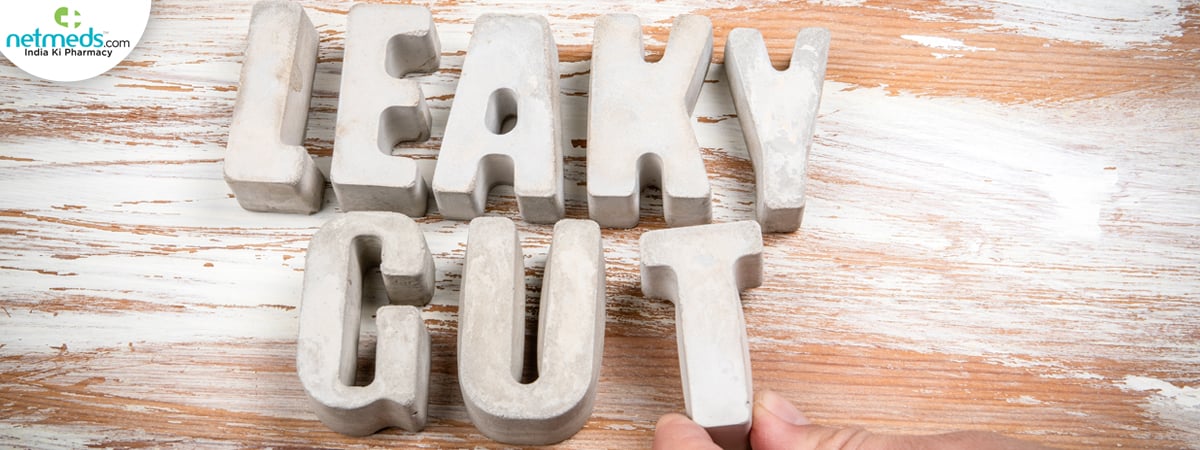Leaky gut is a health disorder where the intestinal lining becomes more porous than it should be. The gastrointestinal lining acts like a protective guard, determining what gets absorbed into the bloodstream and what gets removed. However, in people with leaky gut, minute gaps allow toxins, harmful pathogens and undigested food substances to pass through. This medical issue is known to set off inflammation, fatigue, digestive problems, skin woes and mood swings. Fret not, this issue can be managed conservatively by following the Leaky Gut Diet regimen. It is an eating pattern that improves gut health and eases inflammation. This meal plan is formulated to help heal intestinal hyperpermeability, also called leaky gut syndrome and restore gut balance.

(For Optimal Gut Health And Digestive Function, Shop From Wide Portfolio Health Essentials)
What are the Benefits of the Leaky Gut Diet?
Following a leaky gut diet can have comprehensive benefits, not just for digestion but for optimising overall health. Some of the key advantages include:
Promotes Digestion
This diet plan supports improving the digestion process, regularising bowel movement and better assimilation of nutrients. In addition, it treats common digestive woes like bloating, gas, and irregular bowel movements.
Also Read: The Process Of Digestion: Understanding The Timeline and The Influence of Various Foods
Boost Immunity
A healthy gut is strongly associated with immunity as more than 70% of your body’s immune cells are present in the gut, where they train the immune system and safeguard against harmful pathogens. So, healing the gut can help you fight off infections more easily.
Eases Inflammation
Keeping up a healthy gut microbiota balance lowers overall inflammation associated with severe joint pain, fatigue, and other chronic conditions.
Improves Skin Health
Most people have observed fewer acne breakouts, eczema flare-ups, or rashes while following this diet regimen. In the long run, a leaky gut diet regimen restores gut balance and improves digestive functions.
Improves Mood
Gut and brain health are interconnected via the gut-brain axis. The gut microbiome influences the brain cells through neural, endocrine, and immune pathways. Poor gut health can lead to anxiety and depression. A balanced gut means less anxiety and brain fog.

How to Follow the Leaky Gut Diet Plan?
This diet regimen is not about depriving yourself of food or following an overly strict meal regimen; it’s all about nourishing your gut with natural, healing foods while avoiding those foods that damage the system. Here’s how to start:
Go for whole, unprocessed foods that are natural and minimally processed.
Add a good lot of gut-healing nutrients like amino acids, collagen and antioxidants.
Staying well hydrated supports the normal digestive process and helps eliminate harmful toxins.
Practice mindful eating, slow down and chew your food thoroughly, as digestion begins in the mouth.
Slowly limit intake of inflammatory foods and slowly remove irritants instead of quitting them overnight.
Also Read: How Gut Health Affects Weight Loss? The Science-Backed Connection
Foods to Add
Here we have listed some of the incredible foods that help soothe and repair the gut lining:
Mushroom or lentil soups are rich in collagen and amino acids that heal the gut wall.
Fermented foods such as yogurt, kefir, kimchi, leftover rice porridge and sauerkraut are loaded with probiotics. These foods maintain gut microbiome balance and better absorption of nutrients.
Add fiber-rich vegetables such as broccoli, spinach, carrots, and leafy greens to feed healthy gut bacteria.
Avocados, olive oil, chia seeds, and fatty fish are good sources of healthy fats that help reduce inflammation.
Lean proteins like chicken, turkey, eggs, and fish provide the building blocks for tissue repair and healing.
Anti-inflammatory herbs and spices like turmeric, ginger, and cinnamon are gentle yet powerful healers.
Foods to Avoid
Certain foods can worsen gut permeability and inflammation; it’s best to limit or avoid them while healing:
Packaged snacks, fast food, and sugary cereals.
Refined sugar feeds bad bacteria and yeast in your gut.
Gluten and wheat products can irritate the gut lining in sensitive individuals.
Dairy products can cause bloating or acne; try eliminating them for a while.
Excessive intake of alcohol and caffeine can disrupt gut bacteria and weaken the lining.
Artificial Sweeteners can harm the balance of your gut microbiome.
Who Should Follow the Leaky Gut Diet?
Leaky gut syndrome is linked to digestive issues like IBS, IBD, and celiac, and non-GI conditions like autoimmune diseases, heart disease, obesity, and type 1 diabetes.
This diet is usually recommended for people with gastrointestinal symptoms like bloating, constipation, diarrhoea and flatulence. In addition, this diet also benefits people with allergies or autoimmune disease.
Moreover, people experiencing unexplained symptoms, such as brain fog, fatigue, muscle and joint pain, or recurring infections, may also benefit from the leaky gut diet.
Conclusion
Healing a leaky gut is not an instant fix; it’s about offering the body the time and needed vital nutrients to restore itself. By following a leaky gut diet plan, you can strengthen your digestive system, mitigate inflammation, and feel more energised and balanced from within.
(This article is reviewed by Kalyani Krishna, Chief Content Editor)
Author Profile:
M Sowmya Binu:
With over 15 years of expertise and a Postgraduate degree in Nutrition, M Sowmya Binu is a seasoned professional in the field of nutrition. Specializing in tailoring personalized diet plans, she underscores the significance of a balanced approach to health, emphasising the integration of medication with dietary intake for holistic wellness. Passionate about equipping individuals with knowledge to make informed decisions, Sowmya adeptly develops insightful content encompassing various topics, including food, nutrition, supplements, and overall health.
References:
Leaky Gut and the Ingredients That Help Treat It: A Review
Ricardo Santos Aleman 1, Marvin Moncada 2, Kayanush J Aryana 1,*
https://pmc.ncbi.nlm.nih.gov/articles/PMC9862683/
What to do about the leaky gut”
Michael Camilleri 1, Adrian Vella 2
https://pmc.ncbi.nlm.nih.gov/articles/PMC9028931/



 Previous
Previous